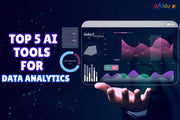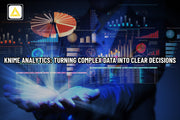Data analytics in 2025 is evolving faster than ever with AI. From automating data workflows to uncovering predictive insights, intelligent platforms now enable teams to make decisions in real time. AI-powered analytics is reshaping how businesses visualize, analyze, and act on data, making insights smarter, faster, and more accurate than ever.
What is AI in Data Analytics?
AI in data analytics refers to using artificial intelligence and machine learning algorithms to process vast amounts of data, detect patterns, and deliver insights automatically. These systems learn from historical data, improving their accuracy over time. Today, AI-driven analytics tools empower organizations to move beyond dashboards — enabling natural-language queries, predictive forecasts, and autonomous decision support. Businesses in the UAE and globally rely on AI analytics to enhance performance and stay competitive.
Why Businesses Need AI Analytics Now
In a data-driven world, companies are inundated with information — from customer behavior to financial trends. Manual reporting is too slow and error-prone to keep up. AI analytics streamlines this by automating data preparation, cleaning, and visualization while delivering actionable insights instantly. AI supports organizations by automating data workflows, uncovering key trends and anomalies in seconds, forecasting future outcomes, and simplifying reporting across teams. In the UAE, where digital transformation and cloud adoption are accelerating, AI analytics ensures smarter decisions, cost efficiency, and compliance across industries.
How AI Transforms Data Operations
AI seamlessly integrates with business intelligence systems and cloud data platforms to eliminate repetitive analysis tasks. Teams can now query data conversationally, generate reports automatically, and visualize patterns dynamically. With AI analytics, professionals can automate data cleaning and integration, detect opportunities or risks using predictive models, interact with dashboards via natural language, and scale insights across departments instantly. The result is less manual reporting, faster insights, and more strategic business growth.
5 AI Tools for Data Analytics to Try in 2025
Here are five powerful tools transforming how organizations visualize, automate, and understand data — ideal for the UAE and GCC analytics market.
KNIME Analytics Platform
Best for End-to-End Data Science Workflows

KNIME is an open-source data analytics platform that simplifies building complete data workflows. It combines drag-and-drop visual design with Python and R integration, making it suitable for technical and non-technical teams alike. Use Cases include creating automated data pipelines, integrating multiple data sources, performing advanced predictive analytics, and visualizing outcomes interactively.
Pricing: Free community edition and enterprise plans for advanced features
| Pros | Cons |
|---|---|
| ✔ Visual drag-and-drop interface ✔ Integrates with Python, R, and cloud sources ✔ Strong community and open-source flexibility |
✖ Steeper learning curve for beginners ✖ Limited real-time collaboration tools |
Alteryx One
Best for AI-Powered Enterprise Analytics and Automation

Alteryx One is an enterprise-grade platform for analytics automation. It empowers users to blend, clean, and analyze data without coding while maintaining scalability and compliance. Use Cases include automated data preparation, no-code workflow creation, predictive modeling, and large-scale governance for data teams.
Pricing: Subscription-based plans with enterprise deployment options
| Pros | Cons |
|---|---|
| ✔ No-code automation for analytics ✔ Excellent governance and scalability ✔ Integrates with cloud and on-prem data |
✖ Paid tool with enterprise focus ✖ Some features require training |
Tableau
Best for AI-Enhanced Data Visualization

Tableau is one of the world’s most powerful visualization tools, now enhanced with AI features. It enables users to turn complex datasets into interactive dashboards and insights. Use Cases include creating live data visualizations, exploring data with natural-language queries, building executive dashboards, and sharing business performance reports.
Pricing: Tiered plans for individuals, teams, and enterprises
| Pros | Cons |
|---|---|
| ✔ Interactive dashboards with AI insights ✔ Strong data storytelling capabilities ✔ Integrates with most databases and APIs |
✖ Requires data-prep before analysis ✖ Desktop version needs installation |
Microsoft Power BI
Best for Business Intelligence in the Microsoft Ecosystem

Microsoft Power BI offers seamless business intelligence for organizations using Microsoft tools. It connects to Excel, Azure, and Teams to provide predictive insights and automated reporting. Use Cases include real-time dashboard creation, enterprise analytics integration, predictive forecasting, and KPI tracking.
Pricing: Subscription-based with cloud and desktop versions
| Pros | Cons |
|---|---|
| ✔ Integrated with Microsoft 365 and Azure ✔ AI-powered predictive analytics ✔ Localized for UAE data compliance |
✖ Limited advanced customization ✖ Some AI features behind premium license |
Julius AI
Best for Conversational and No-Code Data Analysis

Julius AI makes data analysis conversational. Users can chat directly with their datasets, generate charts, and uncover insights instantly — no coding required. Use Cases include natural-language data exploration, instant visualization creation, AI-powered forecasting, and fast report generation for teams.
Pricing: Freemium model with paid plans for larger datasets
| Pros | Cons |
|---|---|
| ✔ Conversational interface ✔ Auto-generates charts and forecasts ✔ Ideal for startups and SMEs |
✖ Limited enterprise-scale functions ✖ Internet connection required |
Final Takeaway
AI is revolutionizing data analytics in 2025, empowering professionals to make smarter, faster, and data-driven decisions. KNIME, Alteryx One, Tableau, Microsoft Power BI, and Julius AI lead this transformation — helping teams convert complexity into clarity and strategy into action. The future of analytics belongs to those who harness AI for insight and innovation.
Frequently Asked Questions
Find quick answers to common questions about AI tools for data analytics.
Q1. What are the best AI tools for data analytics in 2025?
Q2. How does AI improve business analytics?
Q3. Are these tools suitable for UAE enterprises?
Q4. What’s the main advantage of AI analytics tools?
Q5. Where can I explore these tools?






